Christianity: A Cause of Modern Science
Christianity: A Cause of Modern Science
Christianity: A Cause of Modern Science
- No tags were found...
You also want an ePaper? Increase the reach of your titles
YUMPU automatically turns print PDFs into web optimized ePapers that Google loves.
5natural laws, and without the philosophers/scientists totally rejecting the claims<strong>of</strong> religious truth. Seventh, man needs to be seen as fundamentally differentfrom the rest <strong>of</strong> nature, as having a mind that makes him qualitatively differentfrom the animals, etc., not just quantitatively different. The foundations for thisview are laid in the Judeo-Christian world view in Genesis where man andwoman were made in God's likeness and image, and were told they haddominion over the animals (Gen. 1:26-29). So long as all or most <strong>of</strong> false ideasin these areas are believed by a great majority <strong>of</strong> the intellectuals/"wise men" <strong>of</strong>a given culture, a self-sustaining science will not comes to exist in a givencivilization, especially any true science <strong>of</strong> bodies moving in the external realworld (i.e., physics, unlike math).Now, the tie between the acceptance or rejection <strong>of</strong> such ideas and the rise <strong>of</strong>modern science may not be altogether obvious. Hence, a lot <strong>of</strong> explanation isneeded to prove such connections, and this essay is only scratching thesurface. Readers seeking more evidence should read Jaki's works in particular.Also, it should be noted that some civilizations had all or most <strong>of</strong> these falseideas, such as Hindu India, while other(s) had fewer <strong>of</strong> them (China), andother(s) still fewer (Islam). Correspondingly, the last progressed in sciencefurther as compared to the other two correspondingly to the acceptance <strong>of</strong> suchideas, and the second more than the first. For instance, the Chinese lacked thedelusion the heavens were divine and/or living. Such an idea was found in Onthe Heavens, a very influential work by the ancient Greek philosopher Aristotle(384-322 B. C..), which hindered indigenous Islamic science permanently, andChristian science for many centuries before being finally cast <strong>of</strong>f. On the otherhand, Hindu science concerning the material world was crushed by almost allthese faulty intellectual ideas: the external real world and its orderliness weredenied, eternal cycles and the organismic view <strong>of</strong> nature were espoused, andthe heavens were seen as divine. Islamic science would have become selfsustainingpossibly, if its holy book the Quran (Koran) had not emphasizedGod's will and power so much as against His reason, and if Muslimphilosophers and scientists had not become so mesmerized by Aristotle'sphysics and philosophy. Let's briefly consider each <strong>of</strong> these great civilizations in
6turn, and see how these faulty metaphysical concepts held their science backfrom continual development.WHY DIDN'T CHINA DEVELOP SCIENCE BEFORE EUROPE?When we look at the great civilization <strong>of</strong> China, and its marvelous wealth,population, and technological prowess during the ancient and medieval periods,it is easy to wonder why science did not occur there first. Paper, gunpowder, thecompass, and moveable type were all Chinese inventions. China's sophisticatedrice agriculture, improved by selective plant breeding, was much moreproductive than contemporaneous medieval European agriculture. Yet, suchtechnological accomplishments do not prove China had modern science:Nevertheless the accompanying assumption <strong>of</strong> Singer [who influenced JosephNeedham, the great Sinologist <strong>of</strong> Chinese science and technology] and <strong>of</strong> hisera [the early twentieth century] that engineering innovation has almost alwayssprung from prior scientific discovery is not warranted by the facts. Thiscertainly confused Needham about China's influence upon European science,and I suspect that it has not clarified his probing <strong>of</strong> the Chinese phenomena.This distinction Abu-Lughod appears to have missed, which is why it was notmere time and chance China declined whilst the West rose, riding the back <strong>of</strong>the first modern science.What were some <strong>of</strong> the science-hindering metaphysical concepts found inChinese philosophy and religion? First <strong>of</strong> all, the concept <strong>of</strong> eternal cycles wasmost certainly present. One Buddhist monk attacked the Christian dogma <strong>of</strong>creation as follows:Space, worlds, and beings have no beginning nor end if we consider them notin themselves and individuals but in their totality. They are eternal from thisglobal point <strong>of</strong> view. They proliferate without end and during incalculable cosmicperiods progress through successive stages <strong>of</strong> formation, stability, degradationand then a return to nothingness.
8Another metaphysical delusion the Chinese sadly suffered from (though theywere hardly alone) were various a priori pseudo-scientific "explanations" <strong>of</strong>natural events. In Chinese thought the two best examples <strong>of</strong> this were the tw<strong>of</strong>orces <strong>of</strong> Yin and Yang on the one hand, and the book <strong>of</strong> Changes (I Ching) onthe other. Yin (female) and Yang (male) were seen as the two forces pervadingall <strong>of</strong> nature and its processes. As a result, the Chinese would not hesitate toassign "the changes <strong>of</strong> weather to the stillness <strong>of</strong> Yin." Yin and Yang were usedto explain why magnets became attracted to each other, and describe themovements <strong>of</strong> the sun, moon, and stars. Likewise, the I Ching was a manual <strong>of</strong>divination that would line up various sayings and interpretations <strong>of</strong> naturalevents through various symbols such as lines, trigrams, and hexagrams.Through this book any observation in nature ("omen") would be given an instantinterpretation as to its cause and significance. (Compare this to the Romanpractice <strong>of</strong> examining animals' livers to make major decisions <strong>of</strong> state, etc.)Although normally very sympathetic to the claims <strong>of</strong> Chinese culture andscience, Needham still was willing to say: "Yet really they [Han dynastyscholars] would have been wiser to tie a millstone about the neck <strong>of</strong> the I Chingand cast it into the sea." The most widespread <strong>of</strong> pseudo-scientific delusionswas astrology. It plagued Islam, India, even Christendom to a great degree--andChina as well. At the Emperor's court, various "wise men" (astrologers,astronomers, and meteorologists) would interpret and blame on the emperorvarious portents and "signs." What are the costs <strong>of</strong> having such a priori"explanations" <strong>of</strong> natural events? They dull the human mind through thinking itDOES know why such events occur, when in fact the laws <strong>of</strong> nature are stillunknown. To posit such metaphysical entities as Yin and Ya destinies, and thensay they determine natural processes, creates the delusion <strong>of</strong> knowledge out <strong>of</strong>ignorance. Of course, the Chinese were hardly alone in embracing suchscience-hindering deceptions--see Aristotle's On the Heavens, and his fourelements theory, for starters.THE CHINESE VERSION OF THE ORGANISMIC VIEW OF NATUREAnother metaphysical conception that impeded Chinese science was anorganismic view <strong>of</strong> nature, which sees all <strong>of</strong> nature as being one huge living
9creature that goes through a repeating cycle <strong>of</strong> birth, maturity, and death.Humans are considered to be part <strong>of</strong> it and fundamentally being like theanimals, not basically different from them. Correspondingly, Taoism, which wasespoused by the sixth century B. C. Chinese philosopher Lao-tzu, conceived <strong>of</strong>nature as "an all-encompassing living entity animated by impersonal volitions,"was a source <strong>of</strong> trouble for Chinese science. True, Needham, sympathetic asalways, strongly emphasizes how Taoists would contemplate nature andbelieve it had an underlying order. (Needham believed "Tao" could be besttranslated "order <strong>of</strong> nature"). However, the Taoists would not activelyinvestigate nature as opposed to a mystically-inclined contemplation andinactivity concerning it: "He who practices the Tao, daily diminishes his doing.He diminishes it and again diminishes it, till he arrives at doing nothing. Havingarrived at this non-inaction, there is nothing that he does not do." This attitude <strong>of</strong>non-activity (not intended to be taken literally, as even Jaki commented), is atleast partly due to how Taoism would see man as totally weak and impotentcompared to the majesty <strong>of</strong> nature, with which he should see an intimateorganic unity. By seeing nature as a vast, single spontaneously acting organism(albeit as mystically inspiring as that may be for many in the NewAge/environmentalist crowd), it kept them from developing the idea <strong>of</strong> naturallaw in the modern sense. Needham himself, although noting the tie in Chinesethought between the cyclical time and organismic concepts, failed to realize thenegative consequences <strong>of</strong> such concepts by trying to put them in the mostpositive light. However, such ideas have negative effects on developing anactive mindset towards nature, which was necessary to develop modernscience, as Jaki describes:The organismic concept <strong>of</strong> the world (not in the Whiteheadian sense) invariablyfosters a state <strong>of</strong> mind dominated by a nostalgic longing for the primitive goldenage, with its idyllic settings in which everything takes place in an effortless way.In that spontaneous dreamlike condition men live <strong>of</strong>f nature without disturbing it[compare this thought with what some environmentalists believe today!], andcarry out their social propensities without the sense <strong>of</strong> constraint due toauthorities and laws.
10In short, both belief in eternal time cycles and in nature as one huge organismencourage the passivity that opposes the mentally active, investigating spirit <strong>of</strong>science, such as shown by Aristotle and Leonardo da Vinci (1452-1519)dissecting carcasses, instead <strong>of</strong> just meditating and contemplating passivelydeep within a forest about Nature.CHINESE CONCEPTIONS OF THE LAWS OF NATUREThe Chinese believed nature both was orderly and had an actual existence(when not influenced by the rather pervasive, Hindu-derived Buddhist ideas <strong>of</strong>maya, the belief all is illusion). However, they lacked the concept <strong>of</strong> natural law,as ordained by a personal God, which assured nature was rationallyunderstandable to mankind's mind:It was not that there was no order in Nature for the Chinese, but rather that itwas not an order ordained by a rational personal being, and hence there was noconviction that rational personal beings would be able to spell out in their lesserearthly languages the divine code <strong>of</strong> laws which he had decreed aforetime.For a man who was a Marxist (and, admittedly, simultaneously, a very liberalProtestant), this must have been a very hard concession to make, as Jakiobserved, for it points to an ideological cause for why modern science did notappear in China, not an economic or political cause. In contrast, the view <strong>of</strong> how<strong>Christianity</strong>'s concept <strong>of</strong> the rationality <strong>of</strong> God was tied to the rise <strong>of</strong> science inthe West is best stated by the English philosopher Alfred North Whitehead(1861-1947):I do not think, however, that I have even yet brought out the greatestcontribution <strong>of</strong> medievalism to the formation <strong>of</strong> the scientific movement. I meanthe inexpungable belief that every detailed occurrence can be correlated with itsantecedents in a perfectly definite manner, exemplifying general principles. . . .When we compare this tone <strong>of</strong> thought in Europe with the attitude <strong>of</strong> othercivilizations when left to themselves, there seems but one source for its origin. Itmust come from the medieval insistence on the rationality <strong>of</strong> God, conceived aswith the personal energy <strong>of</strong> Jehovah and with the rationality <strong>of</strong> a Greek
12science <strong>of</strong> the external real world, such as physics. The concept <strong>of</strong> eternalcycles, with its view <strong>of</strong> universal destruction and recreation, saturated Indianculture as well. The sense <strong>of</strong> hopelessness and passivity caused by this latterconcept is aptly illustrated by the comment <strong>of</strong> king Brithadratha in the MaitriUpanishad as he contemplates an endless series <strong>of</strong> the transmigration <strong>of</strong> thesoul: "In the cycle <strong>of</strong> existence I am like a frog in a waterless well." Or, considerwhat the god Vishnu told the god Indra in the Brhamavaivarta Purana: "I haveknown the dreadful dissolution <strong>of</strong> the universe. I have seen all perish, again andagain, at the end <strong>of</strong> every cycle. At that terrible time, every single atomdissolves into the primal, pure water <strong>of</strong> eternity whence originally all arose." Ourmodern minds, which presumably automatically reject such concepts, unlessinfluenced by New Age mush, etc., may see their deadening effects onconstructive activity by how some today react to the fear <strong>of</strong> nuclear war: "let useat, and rink for tomorrow we die" (I Cor. 15:32). Worse yet, death is no escape,for that will bring only another rather meaningless life by a rebirth, unless youhave reached the final necessary stage <strong>of</strong> perfection before being absorbed intoBrahma and the end <strong>of</strong> your individual existence.THE HIGH COST OF PANTHEISM AND THE ORGANISMIC VIEW OF THEUNIVERSE FOR INDIAHindu pantheism caused problems in developing a scientific astronomy, for theheavens were seen as divine and animate. Here the organismic view <strong>of</strong> thecosmos levies a terrible tax, for then the heavens are seen as alive with a will <strong>of</strong>their own, instead <strong>of</strong> being merely inanimate, inorganic matter. In contrast,eventually, in the West, Aristotle's view <strong>of</strong> the heavens being divine and/orintelligent was extinguished, but only after many centuries <strong>of</strong> the Christian era:. . . [D]uring the twelfth century in Latin Europe, those aspects <strong>of</strong> Judeo-Christian thought which emphasized the idea <strong>of</strong> creation out <strong>of</strong> nothing and thedistance between God and the world, in certain contexts and with certain men,had the effect <strong>of</strong> eliminating all semi-divine entities from the realm <strong>of</strong> nature.Thus nature tended to become a mechanistic entity, running according to the
13characteristics with which it had been endowed and powered by the forces ithad been given in the beginning.Left to itself, Hindu pantheism never would have eliminated the divine,organismic view <strong>of</strong> nature since it saw no ultimate difference between God andthe universe.The most widespread pseudo-science in Eurasia was (and is) astrology, and tothis day it plagues India with its influence. Tying a person's destiny to anarbitrary interpretation <strong>of</strong> a given position <strong>of</strong> the stars and planets on somegiven day is a denial <strong>of</strong> the scientific outlook. It encourage a passive, fatalisticattitude in individuals through its complete denial <strong>of</strong> free will. Why bother toknow or try to change the world, when your destiny has been decreed by theheavens? Even today, India is saturated by this nonsense, and far more peopletake the predictions made far more seriously than in the West. As Jakiobserved: "Call for such conversion [that is, an acceptance <strong>of</strong> science andmodern technology by a changed mindset] will hardly be heeded as long as thevoice <strong>of</strong> astrologers is not on the wane but on the rise (in spite <strong>of</strong> science andeducation) and carefully listened to by higher government [Indian] <strong>of</strong>ficials."True, astrology attained a grip upon much <strong>of</strong> the Islamic and Christian worlds inthe medieval past, and even devotees in modern, twentieth century Americasuch as Nancy Reagan. Nevertheless, the culture <strong>of</strong> Christendom had built-inlimits to its broad cultural acceptance since it is seen as an idolatrous systemthat also denies moral responsibility. Hence even as astrology grew in the Westwith the recovery <strong>of</strong> the Greek classics and the growth <strong>of</strong> interest in science, theChurch continued to condemn it. Unfortunately, India had nothing intrinsic to itsculture that frontally assaulted astrology--hence, the former remains deeply inthe latter's thrall to this very day.WHY DIDN'T THE ISLAMIC/ARAB WORLD DEVELOP SCIENCE BEFORECHRISTENDOM?Now the failure <strong>of</strong> the Islamic world to produce modern science is much morecurious than India's or even China's. The flourishing <strong>of</strong> Islamic science and
18constant and permanent forms, dimensions, and properties (in nature) onlyfollows the direction <strong>of</strong> habit . . . on this foundation their whole fabric isconstructed." Hence, the metaphysics <strong>of</strong> the Quran, by emphasizing God'sarbitrary and changeable WILL, as opposed to His reason, helped to sinkIslamic science through creating a weak view <strong>of</strong> the laws <strong>of</strong> nature and anorderly universe.THE CONFLICT BETWEEN CHRISTIAN THEOLOGY AND ANTI-SCIENTIFICPAGAN IDEASIn the West, pagan beliefs in eternal cycles, the organismic view <strong>of</strong> nature,astrological speculation, the divinity/aliveness <strong>of</strong> the heavens and the illusionarynature <strong>of</strong> the external world ran into the hard rock <strong>of</strong> Christian theology. Hence,although the classical corpus (as elucidated by Muslims like Avicenna andAverroes who were not truly orthodox) strongly encouraged belief in such antiscientificconcepts in the West, there was always enough intrinsic culturalresistance in the Christian intellectual community as a whole to keep suchpagan concepts from totally mesmerizing Christendom. Most likely, <strong>Christianity</strong>by itself, without the Greek classics (or Hindu-Arabic numerals) would not havecreated modern science. However, the dogmas <strong>of</strong> Christian theology allowed acertain intellectual community to strip the classics <strong>of</strong> antiquity <strong>of</strong> the disastrousinfluence <strong>of</strong> these anti-scientific concepts due to their conflict with their religiousideas, allowing a true modern science to eventually blossom. Of course, ifCatholic Christians had not believed in concepts opposed to these pagan onesdue to their theology, such a conflict would not have occurred and sciencewould not have reached a modern, self-sustaining form in the West. Duhem, inhis Le Systeme Du Monde, maintained that modern science was made possibleby the Bishop <strong>of</strong> Paris Tempier's condemnation in 1277 <strong>of</strong> 219 propositions,which blasted these anti-scientific concepts <strong>of</strong> antiquity.True, Jaki and Duhem mistakenly overemphasize the contribution <strong>of</strong> Christiantheology relative to the ancient Greek contribution to the rise <strong>of</strong> science. Themindset exemplified by the Elements <strong>of</strong> Euclid (living c. 300 b.c.) in usinggeneral propositions in geometry as pro<strong>of</strong>s and building upon them through
20CHRISTIAN THEOLOGY'S LINEAR TIME CONCEPT OF TIME VERSUSPAGAN ETERNAL CYCLESBecause it would involve repeating exactly or almost exactly the events <strong>of</strong> theBible's history, Christians fundamentally could never accept the idea <strong>of</strong> eternalcycles. To a Christian, the thought <strong>of</strong> his savior God dying horribly on a stakerepeatedly again and again is too horrible to contemplate: ". . . because this Hedid once for all when He <strong>of</strong>fered up Himself" (Heb. 7:27). Hence, even whensome Christians influenced by pagan thought accepted by idea <strong>of</strong> eternalcycles, who include the rather unorthodox Catholic church father Origen (185?-254? A.D.) and even St. Thomas Aquinas, the concept was accepted in a highlymitigated, attenuated form that greatly lessened its ill effects. Origen and St.Thomas both still believed in an absolute starting point (creation), and endingpoint (judgment). They still believed free will existed, which mean the passivityand sense <strong>of</strong> hopelessness induced by the treadmill <strong>of</strong> meaningless alterations<strong>of</strong> catastrophes and golden ages in ages past and to come was largelyremoved. Some early Christian theologians, such as Jerome (c. 374-419 A.D.,translator <strong>of</strong> the Latin Vulgate Bible) and Hippoclytus, condemned eternalcycles totally. St. Augustine, the greatest <strong>of</strong> the Catholic Church fathers (354-430 A.D.), was more equivocal, but was willing to forcefully condemn the moreliteral forms <strong>of</strong> eternal cycles, and still believed in creation and judgment. Hedenied reincarnation as well. This allowed him to maintain a basically linearconcept <strong>of</strong> time with the two end points between God beginning everything andjudging everyone. Bishop Tempier's condemnations in 1277 helped put a limiton the acceptance <strong>of</strong> such anti-scientific doctrines through an attack on eternalcycles in proposition 92, and against the eternal existence <strong>of</strong> the universe (abelief necessarily tied to the former) in propositions 83-91. Thesecondemnations helped keep many philosophers/theologians in Christendomfrom totally capitulating to Aristotelian thought, as had happened with Islamicculture with Avicenna Averroes, and the mutazilites. Oresme (1323?-1382), adirect forerunner <strong>of</strong> Galileo in developing physics freed from Aristotelianconceptions, condemned belief in such cycles. Hence, the Christian belief increation and judgment kept Christendom <strong>of</strong>f "the treadmill <strong>of</strong> the Yugas" (Jaki's
21phrase), killing a sense <strong>of</strong> passivity caused by helpless hopelessness, bypromoting a linear conception <strong>of</strong> time that made its precise quantification andcause-effect relations to be more easily conceived.Astrology, that prime example <strong>of</strong> an answer-giving a priori pseudo-science, raninto repeated condemnations by church fathers and theologians in the West. St.Augustine, as noted above, blasted it in the Confessions. Hippolytus hit it hardin The Refutations <strong>of</strong> All Heresies. While the early medieval Church foughtastrology very successfully, the increasing interest in science due to therecovery <strong>of</strong> the Greek classics, made interest in astrology surge as well.Correspondingly, a condemnation <strong>of</strong> astrology figured in proposition 105 <strong>of</strong>Tempier's list. Oresme told the king <strong>of</strong> France, his patron, in a booklet to ignoreastrology. Isadore <strong>of</strong> Spain in the early medieval church attacked it also. RogerBacon (c. 1220-1292), famous for his predictions <strong>of</strong> future human inventions,agreed with astrology to some degree, but still rejected its control overindividuals' destinies as opposed to that <strong>of</strong> nations. Astrology did have somemajor influence in Christendom, but as even Bacon's case shows, there werelimits to the acceptance <strong>of</strong> this pseudo-science that allowed science toeventually develop independently <strong>of</strong> it.CHRISTIAN THEOLOGY VERSUS THE DIVINITY OF THE HEAVENSThe divinity <strong>of</strong> the heavens, normally closely allied to the organismic view <strong>of</strong> thenatural world, was gradually eliminated by the medievals. The mesmerizingpower <strong>of</strong> Aristotle (384-322 b.c.), who propounded such views in On theHeavens, was felt in Europe too, which was why this process took so long.Jerome denied the heavens were alive, but St. Augustine remained in ananguished uncertainty. St. Thomas entertained the notion, but only to a limiteddegree. Even Kepler, the discoverer <strong>of</strong> elliptical orbits <strong>of</strong> the planets, stillbelieved intelligences controlled the movements <strong>of</strong> the heavens. However, dueto an already developed concept <strong>of</strong> natural law there were natural limits onaccepting this idea. "The overwhelming majority <strong>of</strong> European thinkers acceptedthe reality <strong>of</strong> the order <strong>of</strong> nature [unlike the Hindus], and most considered natureto be a self-sufficient creation <strong>of</strong> God, containing all the powers necessary for its
22operation without God's direct intervention [unlike al-Ghazzali's concept <strong>of</strong>occasionalism concerning the universe's natural laws]." Of course, the Christianrejection <strong>of</strong> pantheism, which says the material world is God also, wasinstrumental in destroying the idea <strong>of</strong> the heavens being divine as well.The West began to develop the idea <strong>of</strong> the universe being rationally knowablesince God made it:The cosmologists [<strong>of</strong> the twelfth century] felt certain that all <strong>of</strong> nature wasfundamentally rational because the all-knowing God had made it so. . . . William<strong>of</strong> Conches writes that "the world is an ordered aggregation <strong>of</strong> created things".And Thierry <strong>of</strong> Chartes says: "The world would seem to have causes for itsexistence, and so to have come into existence in a predictable sequence <strong>of</strong>time. This existence and this order can be shown to be rational."The clock maker metaphor for the universe by used by Oresme. Bacon felt allbranches <strong>of</strong> learning had basic unity, interdependence, and interconnectednesssince only one God made them all. With the approval St. Thomas gave toreason in Summa Theologica, science could go forward as secure in theexistence <strong>of</strong> natural law, which was a concept al-Ghazzali and al-Ashari deniedto Islam by emphasizing God's will and power too much relative to His reason.THE IMPORTANCE OF BURIDAN AND ORESME IN BUILDING THEFOUNDATIONS GALILEO USEDThe first key steps in totally discarding Aristotle's physics were done by Buridanand Oresme. For Galileo and Leonardo da Vinci had leaned upon themindirectly for many <strong>of</strong> their seemingly totally new ideas in physics or in otherfields. Ancient Greece had developed a science <strong>of</strong> geometry that could becalled "modern," but this concerns mental entities, not material objects. Itsphysics remained hopelessly backward by comparison due to pagan ideasabout eternal cycles, the irrationality <strong>of</strong> the universe, and the divinity <strong>of</strong> theheavens. The second century astromer Ptolemy, whose work the Almagestespoused an earth-centered solar system, as well as Plato, believed theheavens were divine, which prevented belief that the laws <strong>of</strong> motion on earth
23applied to the stars and planets, and in developing correct conceptions <strong>of</strong> theselaws to begin with. By contrast, the medieval Christian Catholic Buridan, in acrucial passage, anticipated the idea <strong>of</strong> inertia (the idea an object once inmotion continues to move in the same direction until it encounters resistance)through his discussion <strong>of</strong> impetus. Notice the reference to God not directlymaking the laws <strong>of</strong> nature operate:Also, since the Bible does not state that appropriate intelligences move thecelestial bodies, it could be said that it does not appear necessary to positintelligences <strong>of</strong> this kind, because it would be answered that God, when Hecreated the world, moved each <strong>of</strong> the celestial orbs as He pleased, and inmoving them He impressed in them impetuses which moved them without Hishaving to move them any more except by the method <strong>of</strong> general influencewhereby He concurs as a co-agent in all things which take place; 'for thus onthe seventh day He rested for all work . . .' [Gen. 2:2] And these impetuseswhich He impressed in the celestial bodies were not decreased nor corruptedafterwards, because there was not inclination <strong>of</strong> the celestial bodies formovements.Also note this additional statement as a nascent form <strong>of</strong> the idea <strong>of</strong> inertia:But because <strong>of</strong> the resistance which results from the weight <strong>of</strong> the [waterwheel<strong>of</strong> the] mill, the impetus would continually diminish until the mill ceased to turn.And perhaps, if the mill should last forever without any diminution or change,and there were no other resistance to corrupt the impetus, the mill would moveforever because <strong>of</strong> its perpetual impetus.While these passages are only halting steps on a long road to repealingAristotle's physics, they do show a move to break out <strong>of</strong> his conceptions <strong>of</strong> howmoving bodies move. These men show that the Church never uncriticallyaccepted the Greek classics as many in the Islamic world had done earlier.True, it tied itself and lent its authority to the Greek classics excessively, whichset the stage for its eventual disaster resulting from it using force that madeGalileo recant his belief that the earth moved. With the later discoveries <strong>of</strong>
24Galileo, Hooke, Kepler, Torricelli, Boyle, Newton, and others, Europe's sciencetook a vast qualitative leap, but we should not overlook its origins and thesemen's predecessors in the Middle Ages.THE MERTON THESIS STATEDNow Merton's thesis does not claim as much for <strong>Christianity</strong> as the Duhem-Jakithesis does, for the former merely sees seventeenth century Puritan ethicalvalues as being conducive to engaging in scientific endeavors. One partial critic<strong>of</strong> Merton's thesis pointed out how some values <strong>of</strong> Puritanism opposed scienceeven as some promoted it:If seventeenth-century science grew in harmony with Puritan values <strong>of</strong> utility,reason, empiricism, and the glory <strong>of</strong> God, it also grew by distancing its activitiesand goal from other values or sentiments displayed by Puritanism: intolerance,dogmatism, enthusiasm.Also, since Merton is a sociologist, he is approaching science through itsrelationship to the rest <strong>of</strong> society, which is an externalist approach, instead <strong>of</strong>looking at science from inside its own history.Merton lists various values that helped promote science among PuritanEnglishmen in the seventeenth century. One is to glorify God and serve Himthrough doing activities <strong>of</strong> utility to the community as a whole, as opposed to thecontemplative, monastic ideal <strong>of</strong> withdrawal from the community. Through "thedrive for the conviction <strong>of</strong> one's election, . . . the Calvinistic doctrine <strong>of</strong>predestination escapes any drift toward an apathetic pessimism." Throughemphasizing a vocation (again, something useful to the community as a whole)this created diligence, industry, and hard work in Puritans. As the Quaker leaderBaxter put it: "No: no man should do so without a special necessity or call: forthere are general precepts on all that are able, that we live to the benefit <strong>of</strong>others, and prefer the common good, and as we have opportunity do good to allmen." The result is the individual chooses the vocation that is best suited for hisabilities. Reason and education were both praised, the latter needing to bepractical in nature, not highly literary in content, and definitely not consisting in
25the philosophy <strong>of</strong> scholasticism, with which the Catholic "Angelic Doctor" St.Thomas Aquinas is identified.VARIOUS ENGLISH PURITAN SCIENTISTSThe religious values and beliefs <strong>of</strong> many English scientists <strong>of</strong> this period areeasily documented. For instance, Charles Boyle (1627-1691), the deviser <strong>of</strong> thenamesake law concerning the compression <strong>of</strong> gases, the English chemist andphysicist wrote in his last will and testament: "Wish [the Royal Society, a group<strong>of</strong> scientists] a happy success in their laudable Attempts, to discover the Nature<strong>of</strong> the Works <strong>of</strong> God, and prayer that they and all other Searchers into PhysicalTruths, may Cordially refer their Attainments to the Glory <strong>of</strong> the Great Author <strong>of</strong>Nature, and to the Comfort <strong>of</strong> Mankind." John Ray (1627-1705), the greatbiologist, told a friend that sparing time to investigate nature was good: "Whattime you have to spare you will do well to spend, as you are doing, in theinquisition and contemplation <strong>of</strong> the works <strong>of</strong> God and nature." Although not aPuritan himself, Francis Bacon (1561-1626), who some have thought wroteShakespeare's plays, had a Puritan mother who (as mothers tend to do!)influenced him. His emphasis on the utility <strong>of</strong> scientific discoveries, as opposedto gaining knowledge for its own sake, which was Aristotle's tendency, has aPuritan ring to it. Forty-two <strong>of</strong> the 68 founding members <strong>of</strong> the Royal Society(starting through meetings in 1645 un<strong>of</strong>ficially) for which their religiousbackground was known were Puritans. Such a high proportion is very much out<strong>of</strong> whack compared to their proportion in the total English population, which wasmainly Anglican. Sir Robert Moray, Sir William Petty, Robert Boyle, JohnWilkins, John Wallis, and Jonathan Goddard were all prominent leaders <strong>of</strong> theRoyal Society--and all Puritans.Furthermore, the scientific method needs both an empiricist and rationalistapproach to nature to work properly, something which Jaki comes back to againand again. Curiously, Puritanism provided both by having the rationalism <strong>of</strong> St.Augustine's type <strong>of</strong> Neo-Platonism, yet needing empiricism in order to serveone's calling (vocation/occupation) and be useful to the community as a whole.The irony to this is that the man who sparked the Reformation, Martin Luther
26(1483-1546) had anti-rationalistic tendencies, and attacked the Copernican view<strong>of</strong> the universe. John Calvin (1509-1564), whose Institutes <strong>of</strong> the ChristianReligion systematically set the doctrinal agenda <strong>of</strong> many Protestants, includingthe Puritans, was not enthusiastic over many <strong>of</strong> the scientific discoveries <strong>of</strong> hisday. What this shows is the unintended consequences <strong>of</strong> the new religiousvalues <strong>of</strong> Protestantism. Interestingly, even as the Counter-Reformation wasdamaging Catholic science (the Inquisition's effort against Galileo, for instance),Protestant science was taking <strong>of</strong>f, helping to make up for the slack. Although wehave only briefly surveyed the Merton thesis, partly because it overlaps theDuhem-Jaki thesis in pointing to religion as positively influencing science,although by a rather different means. However, it helps to show when piousPuritan scientists discussed thinking God's thoughts after Him and trying toknow God's attributes better through studying His creation (compare Romans1:20), they were not saying this as a rationalization to justify their activities, butreally meant it.WHEN CHRISTIANITY GETS BLAMED FOR SCIENCE: THEENVIRONMENTALIST CRITIQUEA supreme irony is that many environmentalists publicly concede the Christianorigins <strong>of</strong> science, but in a spirit <strong>of</strong> condemnation, since various ecologicaldisasters get blamed on the Bible's injunctions to multiply and subdue the earth.The reversion to ideas rejected by our medieval ancestors--in the "New" Agemovement--involves reviving the ideas <strong>of</strong> eastern mysticism as found inHinduism and Buddhism, and dressing them in some western garb. Of course,the Unity School <strong>of</strong> <strong>Christianity</strong>, "New Thought," and Christian <strong>Science</strong> havebeen at this for decades going into the last century. The religious outlook <strong>of</strong>Transcedentalist Ralph Waldo Emerson (1803-1882), American poet andessayist, was unquestionably pantheistic. Similarly, the United Nations'Environmental Programme's Global Biodiversity Assessment, some 1,140pages long, explicitly condemns the Western (read Christian) worldview asbeing "characterized by the denial <strong>of</strong> sacred attributes in nature, a characteristicthat has its roots in Greek philosophy [a basically false statement, as shownabove--they weren't familiar with Aristotle's On the Heavens evidently], and
27became firmly established about 2,000 years ago with the Judaeo-Christian-Islamic religious traditions." Further, they condemn the abandonment <strong>of</strong> theorganismic view <strong>of</strong> nature thus:This perspective, especially as elaborated in the Judaeo-Christian tradition, sethumans not as part <strong>of</strong> a wider community <strong>of</strong> beings, but apart. . . . Societiesdominated by Islam, and especially by <strong>Christianity</strong>, have gone the farthest insetting humans apart from nature and in embracing a value system that hasconverted the world into a warehouse <strong>of</strong> commodities for human enjoyment.They go on to condemn pagan cultures which converted to <strong>Christianity</strong> that"began to cut down the sacred groves [compare the KJV's translation forCanaanite Asherah poles!], to bring the land under cultivation"! Consideringsuch attacks on <strong>Christianity</strong> for helping cause a rationalistic, scientific worldviewthat led to environmental destruction, it's then absurd to complain about<strong>Christianity</strong> or the Bible as the roadblock to science getting started in the lateMiddle Ages, or to make broad general statements about the necessary warfare<strong>of</strong> science and religion the next time evolution get attacked by variousfundamentalists. As Jaki put it:The argument would make some sense if it were accompanied by therecognition that the medieval state <strong>of</strong> mind nurtured by the Gospel has indeedbeen responsible for the rise <strong>of</strong> science. Responsibility for the effect, themisuses <strong>of</strong> science, implies responsibility for the cause. But the latterresponsibility, which in this age <strong>of</strong> science appears to be the most covetedcredit, the credit for the rise <strong>of</strong> science, is not attributed to <strong>Christianity</strong> when itsmentality is blamed, for instance, by the noted historian <strong>of</strong> technology, L. White,for the ecological misuse <strong>of</strong> science.Hence, if you're an environmentalist or New Ager who blames Christianworldview for creating the science and technology that is supposedly ravagingthe earth, it's time to start admitting the facts <strong>of</strong> history showing how it helped tocause modern science to exist. It's time to stop repeating bromides about thewarfare <strong>of</strong> science and religion that could have come from the 1925 Scopes
28"monkey trial" where the agnostic lawyer for the defense Clarence Darrowembarrassed William Jennings Bryan, thrice-time presidential candidate loserfor the Democratic party, who was assisting the prosecution.Briefly above the Duhem-Jaki and Merton theses were surveyed, which showhow <strong>Christianity</strong> led to the rise <strong>of</strong> modern, self-sustaining science in Europe bystripping pagan Greek thought <strong>of</strong> false metaphysical ideas that hinderedscience, or had values conducive to scientific endeavor practically. Generallythe militant secular view that sways most western intellectuals has allowed theraw facts <strong>of</strong> the Christian role in the rise <strong>of</strong> science to be covered up, <strong>of</strong>tencausing intellectuals to leap some two millenia from ancient Greece to Galileo intheir reconstructions <strong>of</strong> the history science, ignoring the influence <strong>of</strong> the culturefilling the time in between as irrelevant to the rise <strong>of</strong> science. <strong>Christianity</strong>normally only gets "credit" for helping cause the rise <strong>of</strong> a scientific worldviewwhen a whipping boy besides industry or the military is needed for New Ageenvironmentalists. They, like famed science fiction writer H.G. Wells in TheOutline <strong>of</strong> History, commit the error religious historian Christopher Dawsonobserved, by focusing on "the technical and mechanical achievements <strong>of</strong>modern civilization . . . [but lack an] adequate account <strong>of</strong> the movement <strong>of</strong>scientific thought that preceded those achievements and made them possible."What such intellectuals should now consider, with the rise <strong>of</strong> Eastern Mysticism,astrology, and the occult in the west in the form <strong>of</strong> the New Age movement, iswhether and how long science can survive in a world increasingly revertingback to the ideas that had kept it from existing in the past and which <strong>Christianity</strong>had largely defeated, should they deny the second coming <strong>of</strong> Jesus theMessiah will occur, and will occur soon. If one, seeing mankind's pastintellectually as a struggle between "witch doctors" and "attilas" as philosophernovelistAyn Rand did, thinking the medieval worldview dominated by Genesis 1and the Cross was irrational, imagine what would happen if the Zen Buddhistsand monist Hindu mystics dominated the intellectual scene (such as concerningthe perplexities <strong>of</strong> quantum mechanics) instead. For, as Jaki observed, Jesuswas the Savior <strong>of</strong> science--without His birth, life, and resurrection, it neverwould have existed in this world.
29Return to the top <strong>of</strong> this EssayThis page last updated 6/27/99




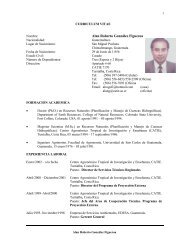
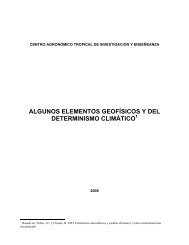
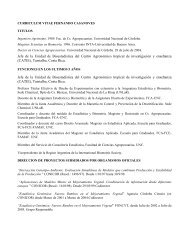
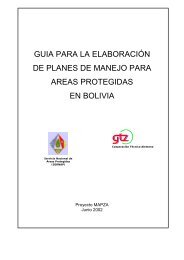
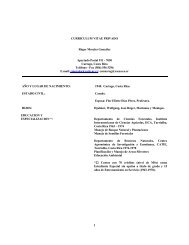
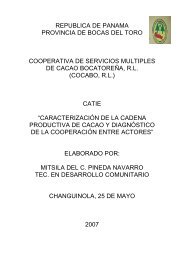
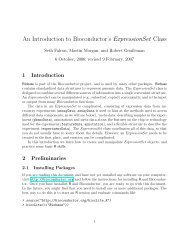
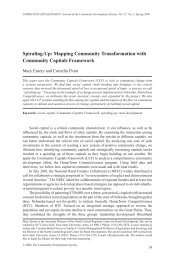

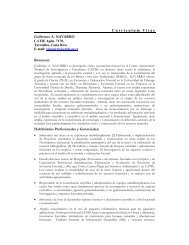

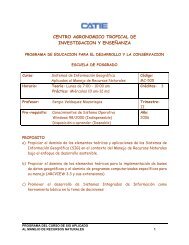
![Tratamientos y MD_2009 [Modo de compatibilidad].pdf - Catie](https://img.yumpu.com/49175499/1/190x134/tratamientos-y-md-2009-modo-de-compatibilidadpdf-catie.jpg?quality=85)